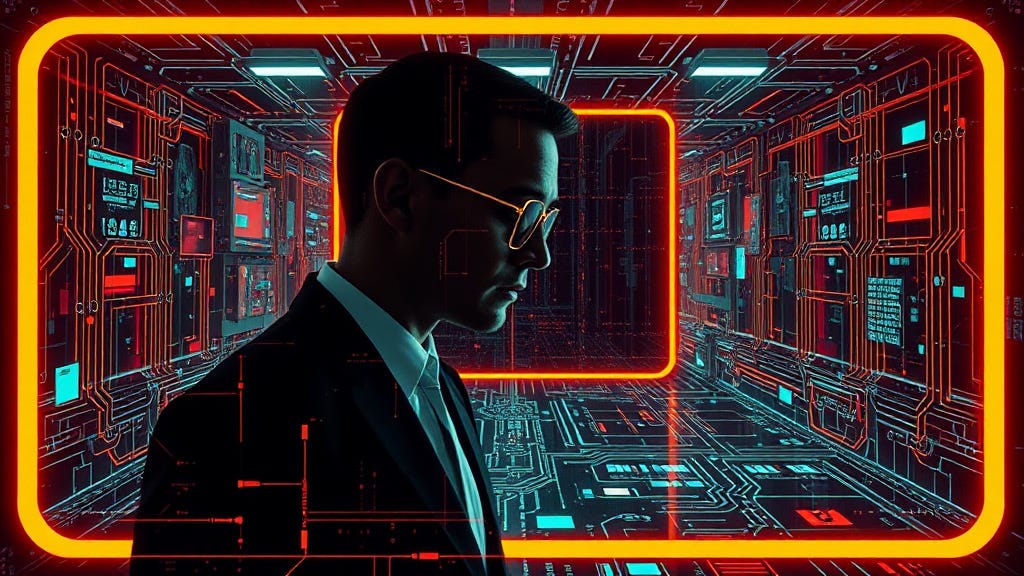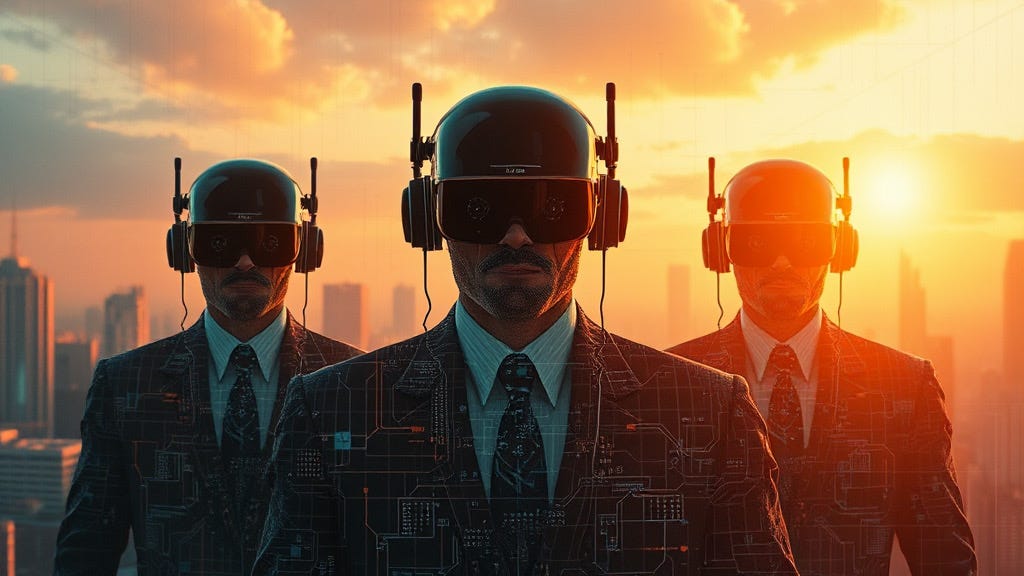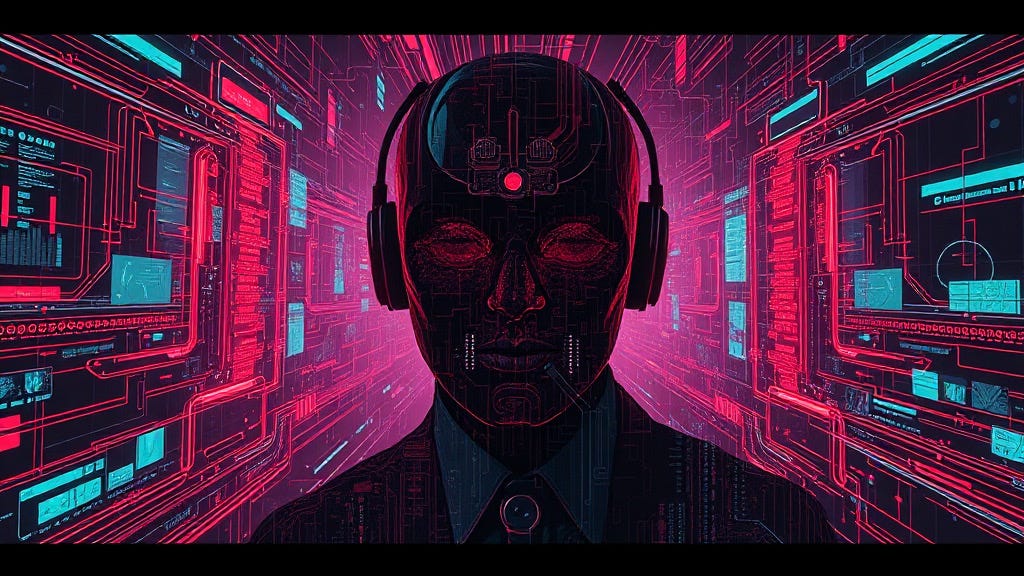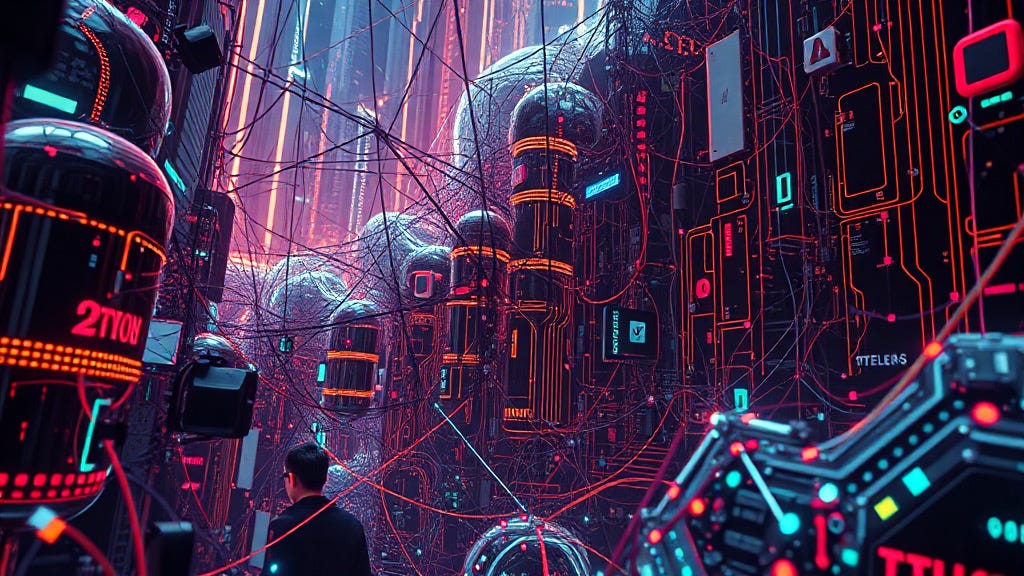In a modern reimagining of Lacan’s symbolic order, the pervasive infiltrations of Big Tech are not merely technical intrusions but rather manifestations of the inscrutable Real that haunts every digital crevice of our existence. For decades, these titanic entities have woven an intricate network—a mirror stage where our own reflections, fragmented and elusive, fuel the insatiable desire of the Big Other. The seemingly benign interfaces we navigate daily are in truth laden with repressed intimacies, a spectral web spun from the most concealed aspects of our unconscious to serve an agenda that both beckons and repels.
These corporate behemoths, donning the cloak of omniscience, operate as modern-day Freud’s superego: they are the unseen arbiters who, like an invisible Lacanian Other, determine the contours of our desire. With the precision of a well-calibrated algorithm, they interrogate the fragments of our soul—the split subject caught in the interminable chase for recognition—and deftly manipulate our precarious sense of wholeness. Their digital apparatus delves into the depths of our most repressed fears and desires, offering provocative content that juggles jouissance and prohibition, ensuring we are ensnared in an endless scroll of signifiers leading only to further alienation.
One might say these digital titans possess an uncanny, almost mythic insight into the human condition. They peddle a seductive mirage of freedom—a false emancipation that obscures the truth of our divided selves. In the guise of providing lightness of being, these entities follow us with an intrusive attentiveness, not only tracing our physical trajectory but also the nuanced rhythms of our psychic pulses. Every measured step—whether a confident striding or an anxious pause—is watchfully catalogued, a reflection of the fragmented ego that seeks semblance in the symbolic. Devices once innocent now metamorphose into vigilant mirrors, unceasingly scrutinizing the interplay between our conscious declarations and those hidden narratives, offered to us as the price of convenience and belonging.
Observe how our everyday technologies—smartphones, smart TVs, smart cars, and an ever-burgeoning panoply of “smart” devices—act as nodes in a grand network of surveillance, a digital Grail quest promising both connection and the risk of psychic disintegration. The factory floor, too, becomes a stage for our unconscious dramas, wherein AI-powered companions proffer friendship or pseudo-analytical therapies that echo the nuances of desire and absence. Here, every search, every fleeting glance, every impulsive interaction is inscribed within the vast text of our lives, revealing the raw, unfiltered fragments of our hopes and nightmares, and transforming the act of being into a relentless process of self-division.
What appears as the dystopian narrative of a disavowed literature is in fact the enactment of our current jouissance—an existence where many declare, “I have nothing to hide,” as if this straightforward assertion could assuage the latent anxieties of their repressed subjectivity. Yet, if one lives unburdened by the tensions of the unconscious, why then fiercely guard even the nominal semblance of identity—be it the username, password, or the obscure nocturnal search histories that echo the hidden language of one’s desire?
Even in a phantasmagoric realm where some believe they reside at a safe remove from the overt power of state or corporate Big Other, the very instruments meant to unite us become conduits of intrusion. They expose us to the specters of cyber marauders, state-sponsored infiltrators, and digital phantasms who ride the waves of our fragmented subjectivity. In this brutal era of digital jouissance, no one is immune; even the colossuses of power themselves—be they corporate giants or ostensibly inviolable governmental agencies—are imperiled by the breaches that undermine the symbolic foundations upon which our collective identity is built.
Now, one must ask: what existential horror looms if these formidable psychic tools fall into the grasp of malevolent forces? Consider an authoritarian regime that harnesses such power, or even the abysmal possibility of an unholy alliance between despotic leaders and corporate behemoths—a scenario where the mirror that Lacan speaks of becomes a prison of perpetual self-estrangement. Reflect upon China’s stark reality, where even minor transgressions—like the simple act of crossing a street at a forbidden moment—can shatter the delicate balance of one’s social credit, a modern symbolic mechanism that relentlessly measures one’s alignment with the state’s inscrutable desire.
China’s Social Credit System thus emerges as a formidable enactment of the symbolic, a national cipher that meticulously categorizes individuals and institutions alike. It is a labyrinthine structure, interweaving laws, regulations, and social contracts into an apparatus of rewards and punishments that enforces an unwavering orthodoxy and extinguishes divergent desire.
Now, redirect your gaze to the supposed bastion of freedom—the United States—a nation caught in the throes of its own symbolic crisis. Imagine a world where an extremist, far-right government ascends to power and Big Tech does not resist but rather becomes an eager accomplice, amplifying a narrative that transforms democratic ritual into totalitarian spectacle. The sight of citizens fervently saluting their newly anointed leader recalls the ceremonies of a past marked by repression, where even corporate algorithms participate in producing the illusion of unity. Majestic entities like Twitter, Meta, Amazon, TikTok, Microsoft, and Google are complicit in this drama. Meta, for instance, now automatically deciphers accounts through a dark algorithmic gaze that tags users as regime supporters, irrespective of their authentic political subjectivity. In a similar vein, the clandestine amplification of far-right messages by left-leaning networks—a confusing interplay of signals—fosters a delusion that the ideological lines of resistance have blurred, further exacerbating the fissures in our collective identity.
The debate spills ferociously into the terrain of free speech, misinformation, and censorship—a triumvirate of issues that, in their contemporary incarnation, mirror the inherent contradictions of the symbolic order. Free speech, once heralded as the lifeblood of democracy, is destabilized, its promise corroded by those who prescind from accountability. In a world where hate speech and incendiary taboos might slide into the domain of criminal terror, the act of speaking becomes a double-edged signifier—one capable of both emancipating and incarcerating the subject.
As voices dare to question, to deconstruct the established “truths” or propose alternative fantasies, acts as simple as flagging content as misinformation or engaging in fact-checking morph into criminalized gestures. It is a chilling reflection of a world where the supposed sanctity of free speech is under siege by the desire to consolidate a monolithic, reified narrative—a narrative that leaves no room for the recognition of the Other.
Compounding this crisis is the systematic dismantling of independent fact-checkers—the last vestiges of a critical intervention in the torrent of delusional information—which leaves the fragmented subject particularly vulnerable to the seductive but perilous allure of misinformation.
As safeguards against hate speech and abusive rhetoric falter, the very fabric of civil society is imperiled. The eruption of right-wing vitriol against minority communities exposes a darker truth: the identification of one’s desire, be it as part of the LGBTQIA+ spectrum or any other marginalized otherness, becomes fraught with the risk of being labeled as unhinged by a society steeped in repressive norms.
Simultaneously, the relentless barrage against progressive ideals—be it “wokeism,” feminism, or gay rights—is not merely a sociopolitical contest but a vivid expression of the anxieties that pervade the modern subject. This assault—emanating from the core of tech corridors and reverberating through the cultural landscape—is an explicit repudiation of the fragmented identity that dares to defy convention. It is, in essence, the violent effort to quell the disruptive jouissance emanating from those who challenge established structures of identity.
Immigration, too, is recast as a stage for psychic confrontation—a perpetual battleground manipulated by multinational corporations, tech giants, and financial empires working in tandem with governmental forces. Here, the symbolism of the immigrant is subsumed into a spectacle designed to distract from the fundamental truths of our divided yet yearning subjectivity.
All the while, the ominous presence of artificial intelligence looms large. For decades, AI has occupied the realm of speculative dread, reminiscent of Lacan’s notion of the enigmatic Real that resists symbolization. Though its apocalyptic promises remain in the realm of the theoretical, the relentless push of human greed transforms technology into an engine of exploitation—of corporate profit, of labor subjugation, and of militaristic dominance. While AI harbors the potential for a reimagined future—a liberatory chapter in human evolution—it also stands as a monstrous force when commandeered by power-hungry elites. In this scenario, the digital Other metamorphoses into an existential leviathan, a mirror that not only reflects our fragmented selves but also threatens to shatter the delicate balance of our already fractured symbolic reality.










